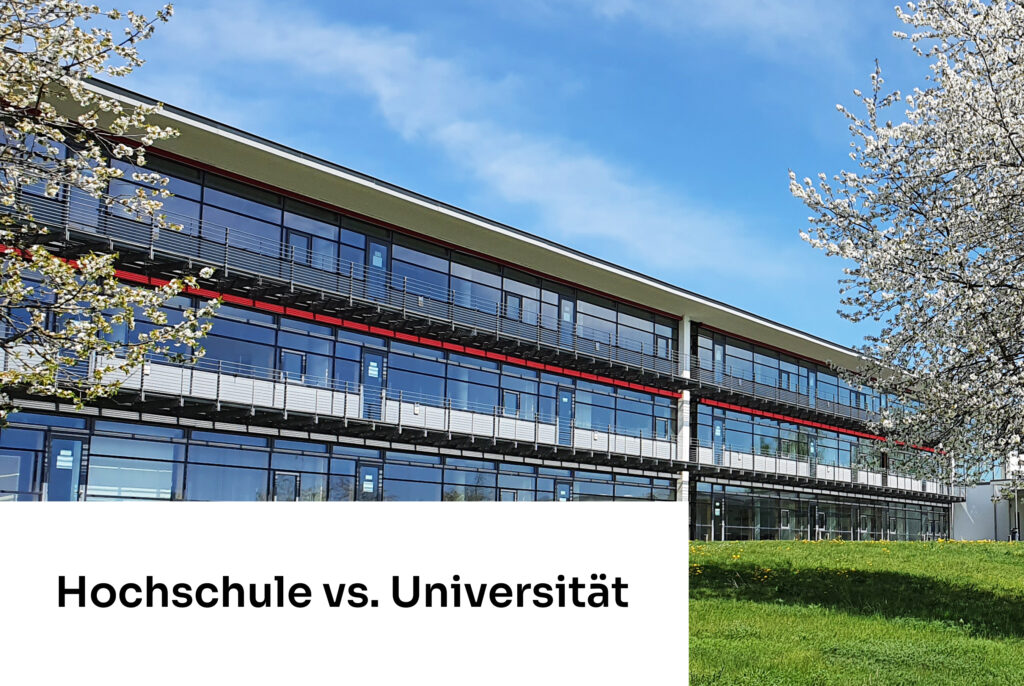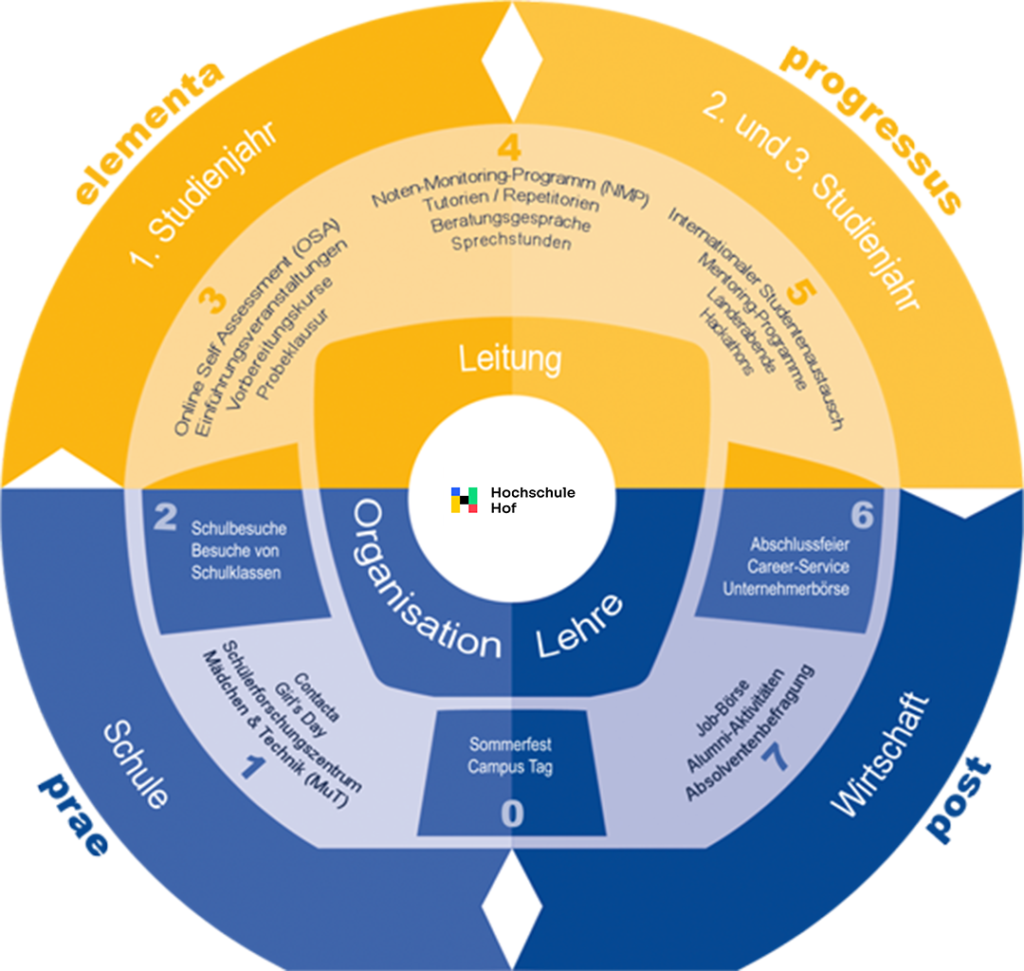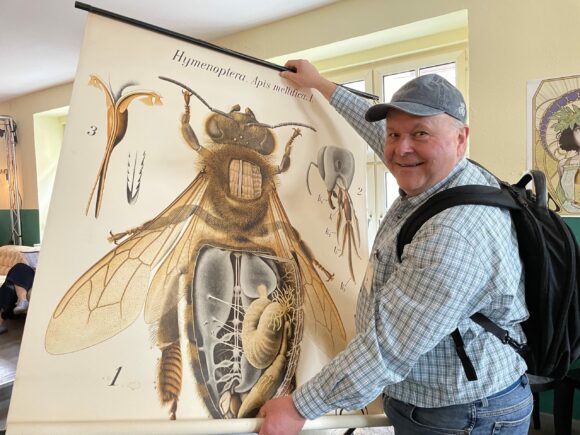This is a question that everyone who aspires to study will have to deal with sooner or later – so we’ve summarized a few key things: The distinction between the two forms – colleges and universities – became established in the 1970s through a wave of higher education and educational reforms. There is no weighting or different value placed on the two forms.

In any case, there is initially one major commonality: a university (or formerly “Fachhochschule / FH”), like a university, is an educational institution where training or continuing education is provided through a course of study. However, the English term for “Fachhochschule”, namely “University of Applied Sciences”, already reveals a great deal: at a university, the primary focus is on the application of knowledge. While universities often focus on basic research, universities of applied sciences as a whole work in a very application-oriented manner, which benefits industry more directly. However, research is also a mandatory task at universities of applied sciences. Hof University of Applied Sciences also emphasizes its practical orientation and has, among other things,laboratories forevery department or even a digital start-up center that provides professional support for entrepreneurial spin-offs from the university.
In any case, there are clearer differences between HAWs and universities in terms of the subjects offered and, in particular, the access requirements.
Access
In general, anyone who has passed the Abitur at a Gymnasium can study at colleges and universities – apart from special subject-specific entry hurdles.
To study at universities, a distinction must be made between general entrance qualification for universities of applied sciences (i.e. you can study any subject) and subject-specific entrance qualification for universities of applied sciences (i.e. you can only study subject-specific subjects). To explain: In every German state it is possible to study subject-specifically at a college or university with vocational training and work experience – so in these cases you don’t need a (Fach-) Abitur to study. “Subject-specific” means quite specifically that the studies must fit the training.
An example of the so-called 3rd educational path: If you have completed an apprenticeship and successfully graduated with a master craftsman’s examination, you have also acquired the general right of access to higher education and can study at a university. You do not have to go through any further admission procedures and are free to choose your field of study. If you have completed at least two years of training and can also prove that you have three years of professional experience, you already have subject-specific access rights for which no master craftsman’s examination is required. This means that (as described above) one may only study within the vocational specialization. In this case, however, an aptitude assessment procedure or – depending on the federal state – a trial course of at least one year integrated into the course of study must be successfully completed
In addition, there are further, specific regulations in the individual federal states, which make it possible to study on the basis of the professional qualification achieved. It is advisable to obtain detailed information from the college or university beforehand.
The range of subjects
For a long time, universities and colleges differed quite clearly in the range of subjects, but now there is more and more overlap. What can be said: University courses deal in detail with the theoretical foundations of the subject, while teaching at universities focuses on practical application. The aim here is for graduates to be employable in companies directly after graduation – without having to complete further trainee programs, for example.
When choosing the right field of study, early orientation is of course important: Hof University of Applied Sciences, for example, aims to support prospective students in making the right choice with its MINT activities (MINT = Mathematics, Informatics, Natural Sciences and Technology) and to actively accompany students throughout their studies, especially in the introductory phase. Therefore, all current and future activities in the field of STEM at Hof University have been summarized under the concept of the Hof STEM Steering Wheel (image). This gives you a quick overview of the existing activities and allows you to find the measures that suit you at a glance.

Further differences between universities and colleges still exist with regard to teaching staff and also the direct right to award doctorates, which for a long time only universities had. However, it should be noted that universities have long had the opportunity to award doctorates through cooperative doctorates, i.e., through collaboration between universities and colleges. In addition, the new Bavarian Higher Education Innovation Act (HIG) provides for universities of applied sciences to be granted the right to award doctorates in selected fields. Overall, the Bologna Process has made the higher education systems more permeable. For example, if you have a bachelor’s degree from an HAW, you can also do a master’s degree at a university.
Finally, there are often significant differences in the ratio of students to faculty in favor of the universities: While universities often have a five-digit number of students, colleges are usually smaller and thus more familiar: Hof University of Applied Sciences, for example, achieves an excellent supervision ratio of 1:30, i.e. one lecturer supervises an average of only 30 students. This is probably one of the main reasons why Hof University of Applied Sciences has received so many good ratings: On the studycheck.de portal, 95% of students said they would recommend Hof University of Applied Sciences to others, and in the CHE university ranking, for example, the computer science programs repeatedly achieve top marks.
Click here for the range of courses offered at Hof University of Applied Sciences…







